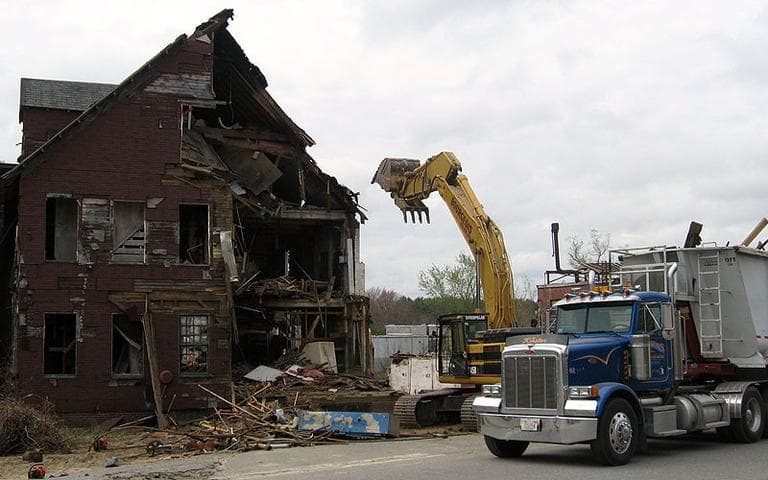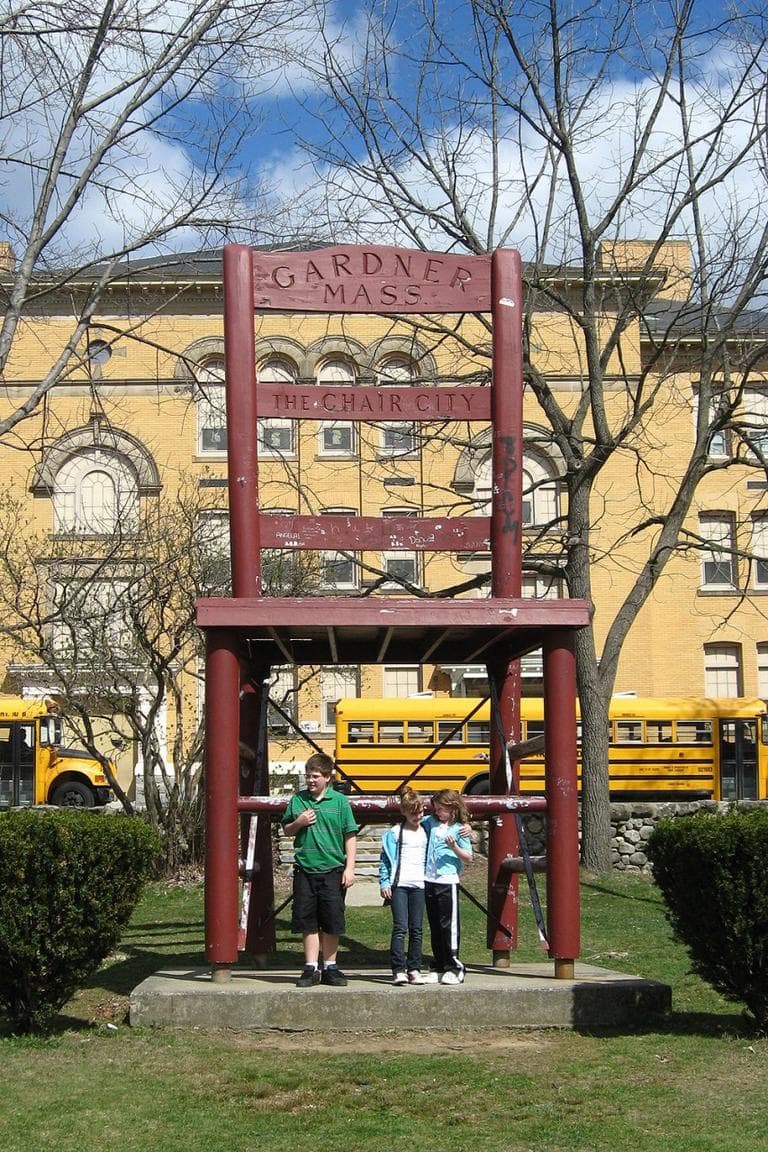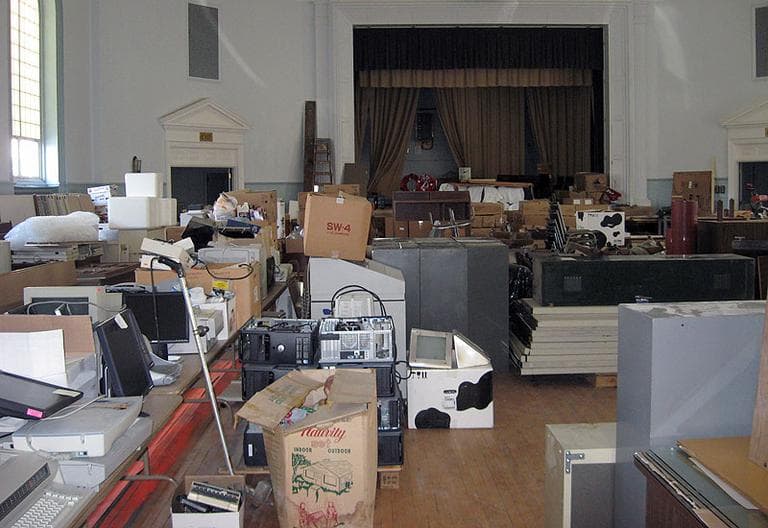Advertisement
In 'Chair City,' Budget Cuts Are 'Amputating' Municipal Services
ResumeThis spring, WBUR is examining how the state budget crisis is reverberating in cities and towns across Massachusetts. In our report earlier this month, Hull students and parents have been forced to pay for extracurricular activities, such as theater, themselves. The tour continues with David Boeri in Gardner, where cuts have bitten deep into a once-thriving city's services.

GARDNER, Mass. — Across from the mill pond and the cemetery where the founders of S. Bent & Brothers, Inc., are buried, a wrecking crew has been knocking down the chair-making complex that once co-starred with a constellation of furniture makers that shone for a century and a half. And not just the buildings are disappearing. Still fresh is the imprint of the newly removed old tracks that once connected S. Bent & Brothers to the mainline that crossed Massachusetts.
As a 7,500-foot-long train full of freight rolls through here every night, it accentuates the economic decline of a city where once there was every reason to stop, when Gardner factories turned out four million chairs a year and it was the chair-making capital of the world.
"It used to be a booming city at one time," says city employee John Hallock.

Even at mid-century, he recalls, when furniture makers started turning to North Carolina — as they've since turned to Asia — Gardner mills were still strong and hungry for workers.
"You could have a job and leave it and five minutes later, you'd be walking into another one," Hallock says. "Oh, yeah. We had a lot of employment here."
Powered by industry, the city of 20,000 — one of the smallest cities in Massachusetts — built its own municipal golf course and indoor swimming pool, a hospital, a community college, grand parks and stately buildings, like the Georgian red brick City Hall on the common.
Now the last big factory has pulled out and the trains roll by without stopping. And atop the long-term decline and loss of local revenues, the recession-triggered budget crisis has grown like weeds on the side tracks.
Gardner's young, upbeat second-term mayor, Mark Hawke, provides a downbeat tour of cuts, consolidation and streamlining necessitated by acute cuts in local aid now that the state's revenues have hit hard times.
"Engineer's office," he points out. "We used to have an engineer, assistant engineer, a surveyor, auto cad person and the clerk. Cut the staff in half here."
Down the quiet hallway, where his foot steps echo, he passes an empty office.

"We used to have a local building inspector as well as a building commissioner," Hawke says, "but we had to let them go."
Hawke introduces me to department heads with no hands. Not even a part-time clerk.
"Scott Brown for Senate" signs tucked into his office reveal the mayor's lean-thinking, small-is-beautiful philosophy of government. But Mayor Efficiency notes you can only streamline and consolidate local government so much before it turns ridiculous.
"The department of municipal grounds, parks, playgrounds, cemetery, forestry, flood control, insect control, golf course and swimming pool," he points out. "One clerk."
And don't count on finding the department head in his office, either. Michael Gonyeo is too busy mowing grass, digging holes at the cemetery or cutting trees, where I caught up with him.
"We have a list on my desk right now — it's probably six-years-old — it's a list of people who have called because they need tree work. Branches and limbs have fallen in their yards or on their roofs," he says. "We haven't gotten to them."
If you live in Gardner and there's a death in your family, the grounds crew will make sure the hole gets dug in the cemetery. You'll have to wait for tree work. And don't even think about calling to get your cat out of the tree.
"I hate when they yell at you and swear at you and hang up the phone," Gonyeo says, who is as conscientious a city employee as you can find. "I understand their frustration but we're only four guys and we can only do so much."
That will change when the new budget comes in: They'll be only three, says Hawke.
What becomes apparent in Gardner, as I talk with the 37-year-old mayor, is how the core functions of municipal government are shrinking to the four corners of police, fire, schools and streets — which themselves are stressed and competing for available funds.
At a recent budget meeting, Hawke told his department heads to forget about their wish lists. They amounted to $2.5 million, and he still has to cut another $600,000 from the proposed budget to balance it.
"There's really nobody left in City Hall to cut," he observes.

"You can only right (the) size of government so much — which I'm a big fan of — until it becomes the right size," he adds. "But, after that, as I said, you're just amputating."
It was time to say good-bye — in part because Gardner City Hall now closes at noon on Fridays to save a half day. But first Mayor Hawke wanted to show me the building's auditorium.
"Watch your step," he cautions as the door opens into a grand, high-ceilinged ballroom with a balcony befitting a place called "Chair City."
There's a hole in the floor, floor boards are warped, a once-leaky roof has flaked the paint off the ceiling, light streams through abundant single-pane windows, and there's been no working heat since the leaking underground oil tanks for the furnace were removed a few years ago.
"We can't afford to fix it, we can't afford to tear it down," Hawke says. "This is just a microcosm of what's happening across the state to local government as a whole. We can't afford to fix the buildings that we operate in and we can't afford to have staff in them (either)."
And soon when the Gardner finds out how much — or, more to the point — how little it's going to get in state aid, it may be emptying still more chairs in The Chair City.
This program aired on April 27, 2010.
